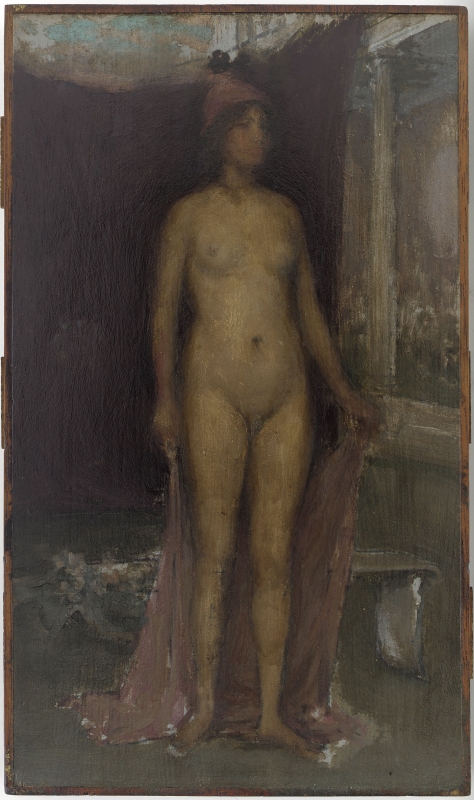Titles
Minor variations on the title have been suggested:
- 'Purple & Gold – 'Phryne the Superbe! – Builder of Temples' 1899, Whistler). 1
- 'Purple and Gold – Phryne the Superb ! – Builder of Temples' (1901, ISSPG). 2
- 'Phryne' (1899, 1902, Whistler). 3
- 'Pourpre et Or – Phryne la Superbe, qui batit des Temples.' (1902?, Whistler or R. Birnie Philip). 4
- 'Purple and Gold: Phryne the Superb ! – Builder of Temples' (1980, YMSM). 5
It was admired by the American-born Symbolist poet Francis Vielé-Griffin (1864-1937), whom Whistler had met by 1893. 6 It is possible that it was Vielé-Griffin, or another poet in the same circle, such as Stéphane Mallarmé (1842-1898), who suggested the title.
'Purple and Gold: Phryne the Superb! – Builder of Temples' is the preferred title.
Description
A full-length study of a nude woman, in vertical format. She stands slightly turned to her left, her arms at her sides, holding a robe behind her. She wears a Phrygian-style cap. Behind her is a purple curtain, and at right, a pillar supporting a balustrade, over the entrance to a garden. There are roughly indicated pots behind her on each side.
Sitter
Whistler's model has not been identified.
The courtesan Phryne, the mistress of Praxiteles, offered to rebuild Thebes at her own expense after its destruction by Alexander.
The Freer Gallery of Art website commented:
'As recorded by several Greek commentators, Phryne was both a rich woman - a "Builder of Temples" - and an artist's model. Indeed, she was the archetypal female model: the woman who posed for the first monumental female nude in the history of Western art, the Aphrodite of Cnidus by the Greek sculptor Praxiteles. Praxiteles obscured the identity of his model (and mistress) by representing her as a goddess. Whistler brings the history of the female nude full circle by undoing this mystification. Ignoring the idealized marble goddess within the temple, he gives us the flesh-and-blood model in the artist's studio.' 7
Comments
After Whistler showed this painting to him, Lucas (Luke) Alexander Ionides (1837-1924) described it as 'a small picture of Phryne, with her hand extended on an altar', and he accused Whistler of deriving the idea from a tanagra statuette in the British Museum; Whistler was amused and asked Luke to show him the statuette. 8
Notes:
1: Listed, [April/May 1899], GUW #12718; Paintings at the ISSPG [M.1583].
2: 3rd Exhibition, Pictures, Drawings, Prints and Sculptures, International Society of Sculptors, Painters and Gravers, Galleries of the Royal Institute, London, 1901 (cat. no. 37).
3: Plan of a panel of pictures for the ISSPG [M.1582]; Company of the Butterfly to C. L. Freer, [23 March/May 1902], GUW #04332.
4: Handwritten label, Freer Gallery of Art.
5: YMSM 1980 [more] (cat. no. 490).
6: Whistler to Freer, 28 July 1902, GUW #09761.
7: Freer Gallery of Art website at https://asia.si.edu/object/F1902.115a-b.
Last updated: 17th December 2020 by Margaret






